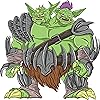Gordon Grant
asked:
Does anyone else think Mr. Simmons demonstrates a streak of racism in this book? The uniformly vile description of India and all the people he encounters there in contrast to the idyllic visions of Vermont, Colorado and his lovable, New Yorker friend Abe leaves a sour, xenophobic taste in my mouth.
To answer questions about
Song of Kali,
please sign up.
J. Mill
No. His vision was specific to Calcutta as one of the places on earth that are "black holes in reality." He didn't talk about the rest of India. He posited the entire city as a place where evil things were very close to this plane of existence, thus the plethora of bad actors. His character was caught in a web of deceit and evil. Why would you find it shocking that most of the people he came into contact with had bad intentions? His description of Calcutta is dead on the money for the 70's (and may still be today, for all I know). If you want "balance" in your fiction then what you really want to read are travelogues, not fantasy/horror. Don't look for racism in every story, because you find it in anything if you look hard enough.
L
A streak?!? Talk, about understatement! I found it very disturbing, especially from an author whose work I've truly loved. The story itself, ok, horror. But all of Calcutta and her people as filthy, disgusting, dishonest and evil? As for the take on one of India's goddesses? Wow! I will admit to being pretty ignorant of Indian religions. But, this was over the top.
Ben Herman
Are authors not allowed to portray anything in a negative light anymore without being called racist?
Manoj Kerai
He uses Hindu Goddess Kali and completely ruins her story. She is the destroyer of evil, not the heart of evil!
Joe Piccoli
He does comment at the end of the novel about the evils that take place in America as he recounts current news articles. This, to me, seems to come to the conclusion that evil exists everywhere and not just Calcutta and is what the main character eventually realizes. If you peel back the rug in any house you will find dirt.
Grant Spendlove
To say that the author's and narrator's views and philosophies are necessarily the same, especially when it comes to the world of horror fiction, is so off the mark I can't even. If I write a book about cannibalism, and my first-person narrator speaks to the reader about the joys of eating human rump roast, does that make *me* pro-cannibalism? No. Luczak in the book hates the city of Calcutta because of what happened to him, his wife and child there. He wants to see the whole place nuked because he believes the city itself is a slimy, vicious, evil entity that needs to be destroyed for the good of mankind. Perfectly understandable when you consider everything Luczak went through there. A tourist in the U.S. might feel the same way about New York, or all Americans, if he were beaten and robbed during his trip. You could hardly blame him. An author's characters tell you nothing about the author. The whole point of writing fiction (especially horror fiction) is roleplaying: putting a regular guy (someone the reader can identify with) into direct conflict with forces impossible to fathom and circumstances beyond his control, and seeing how he deals with and reacts to the resulting mess....and that includes telling how he feels about the whole thing when it's all over, assuming he survives. (Honestly now, how *should* Luczak feel about Calcutta at the end of this story? Willy Wonka's Chocolate Factory or Hell On Earth? You tell me.)
Björn
Yes! I've finished this book as well as "The Terror" during this last week, and I must say Mr Simmons does not seem to think too highly of other cultures.
Sam Rogers
No I don’t think so. He wasn’t talking about India as a whole just that region. Artistic license to describe a place as pure evil so it would work for the story. It’s similar to a folk horror story where all the residents of a town or city are “in on it” or in this case at least know about what’s going on behind the scenes. Also in the 70s when this was based on he wasn’t too far off the mark when describing how bad of shape Calcutta was.
Balbir
Simmons is a terrific writer; I have read most of his books but kept avoiding this one as I suspected that there might be certain... issues, and when I eventually got round to it, I wasn't disappointed
The portrayal of Calcutta may be forgiven, as it, and the deity it hosts, are supposed to signify evil; however, there are multiple other problematic issues: not a single Indian character (barring the wife, who is Westernised, and is not really treated as an Indian) is portrayed positively; usually, such books contain at least one or two native characters of integrity; moreover, Simmons makes numerous profoundly ignorant, if not outright racist, remarks-for eg stating Sikhs were responsible for most of the killings during the partition (!?); Simmons seems to have done some research, but not enough, about the subject matter, as there are a lot of factually incorrect things peppered throughout the book (about subcontinental history, mythology, etc)
From an Indian perspective, this book has plenty of vexatious parts, to say the least
The portrayal of Calcutta may be forgiven, as it, and the deity it hosts, are supposed to signify evil; however, there are multiple other problematic issues: not a single Indian character (barring the wife, who is Westernised, and is not really treated as an Indian) is portrayed positively; usually, such books contain at least one or two native characters of integrity; moreover, Simmons makes numerous profoundly ignorant, if not outright racist, remarks-for eg stating Sikhs were responsible for most of the killings during the partition (!?); Simmons seems to have done some research, but not enough, about the subject matter, as there are a lot of factually incorrect things peppered throughout the book (about subcontinental history, mythology, etc)
From an Indian perspective, this book has plenty of vexatious parts, to say the least
Alexandra
Yes This is why I gave this book two starts. I would have given it three but I found it to be an incredibly insulting mix of exotification and xenophobia.
Cristina
It's funny because I just got this ebook on a special, and after a few pages I found the tone a bit disturbing. It reminds me a bit of Conrad's Heart of Darkness. Not sure I am interested in continuing. It may have fared better if he made it a fictional city.
Rene
Call it artistic license, hyperbole and exaggeration.. But indeed there does exist a huge and deep chasm between the reality of idyllic American life and that of the Indian subcontinent. No doubt.
Ville Kokko
His use of many real-life quotes about how evil Calcutta is seems to suggest that he wants to make the case that it is an evil place in real life as well. It's like he's saying "I'm not making this up, you know." There is also an exchange of dialogue that seems to be meant to communicate the view (which is expressed by one of the participants and comes across the more reasonable one) that some cultures are inferior to others. (To that I would say that it would make sense to judge individual cultural practices, but judging whole cultures instead goes into a whole different kind of discussion, more attitudes than reason.) So he does seem to be expressing a negative view of at least Calcutta. In some broad sense, such a view would be called racism, although it could be motivated simply by eg. dislike of Calcutta specifically. I think he could have written the same story without giving such an impression, at least to me. For example, cut down on the real life quotes and it would seem more plausibly like fictional hyperbole that is to be understood as such.
Mind you, I should say that reading all these different interpretations by different readers in the reviews makes me wary of judging how this "really" is, especially when it's been a while since I read the book.
Mind you, I should say that reading all these different interpretations by different readers in the reviews makes me wary of judging how this "really" is, especially when it's been a while since I read the book.
A
I came here to check if I should read this book because I was afraid it would offend me. I am a Hindu and an Indian and I think the idea of Kali being portrayed as evil will be very offensive to me. I know its fiction but its still wrong to make up things that go against the accepted beliefs. It spreads harmful information to those who do not know any better. Like Indiana Jones: Temple of Doom. India has the largest population of vegetarians in the world and it was sickening to me that they alluded that Indians consume monkey brains and eyes and such. I am sure Christians would be offended if some Saint who is worshiped by them is portrayed as evil in someone's fiction. I think I will skip this one.
Steve
Simmons writes of 1977 Calcutta when, according to Wikipedia: "During the 1960s and 1970s, severe power shortages, strikes and a violent Marxist–Maoist movement by groups known as the Naxalites damaged much of the city's infrastructure, resulting in economic stagnation. The Bangladesh Liberation War of 1971 led to a massive influx of thousands of refugees, many of them penniless, that strained Kolkata's infrastructure." Wikipedia also notes that "...the city's economic recovery gathered momentum after the 1990s when India began to institute pro-market reforms. Since 2000, the information technology (IT) services sector has revitalized Kolkata's stagnant economy. The city is also experiencing marked growth in its manufacturing base." So, if this information is at all accurate, one would not find the absolute hellhole Simmons describes if one were to visit the city today. Though, with global warming wreaking havoc on the entire planet, I imagine the nightmarish weather Simmons describes has improved any.
Joy
This is an article from the LA Times from 1985, the same year the book was published.
http://archive.today/t2e8k
http://archive.today/t2e8k
Glabrezu
You have to separate the writer from the narrator. Dan Simmons doesn't demonstrate anything in this book, it's Mr. Luczak who is a polish russophobe and indiaphobe, which is fine by me, as it's just a character.
Matthew Taylor
It would be similarly presumptive to call Bret Easton Ellis a misogynist on account of American Psycho, which would be to entirely miss the point as a critique of misogyny.
The CHARACTER in Song of Kali is presented as xenophobic, he is blunt and caustic towards foreigners, is lost and afraid as a fish out of water. As much as he is revolted by the filth and poverty and maze of back alleys, he is also saved by the same things. A lesson in hubris, and no more racist than say Dickens descriptions of Victorian London.
His publisher also remarks that your own perception of a place can be tainted by associating it with a bad experience. You see it all the time not just with countries …”ill never drive that make of car again after the crash” “i cant drink tequila again after i threw up” “i hate those flowers because they were my ex partners favourite before we seperated” etc..
The message is more that trauma pollutes the mind and the memory.
The CHARACTER in Song of Kali is presented as xenophobic, he is blunt and caustic towards foreigners, is lost and afraid as a fish out of water. As much as he is revolted by the filth and poverty and maze of back alleys, he is also saved by the same things. A lesson in hubris, and no more racist than say Dickens descriptions of Victorian London.
His publisher also remarks that your own perception of a place can be tainted by associating it with a bad experience. You see it all the time not just with countries …”ill never drive that make of car again after the crash” “i cant drink tequila again after i threw up” “i hate those flowers because they were my ex partners favourite before we seperated” etc..
The message is more that trauma pollutes the mind and the memory.
U M
Yes - and i wonder if this book would be quite so lauded if it had been written today.
I read the Hyperion novels several years ago and was impressed by them, so am startled to come across this book by the same author.
the only excuse I can suggest for Simmons is that this is an early and immature work.
I read the Hyperion novels several years ago and was impressed by them, so am startled to come across this book by the same author.
the only excuse I can suggest for Simmons is that this is an early and immature work.
TwoTonYoda
Definitely not. If you want to look for hate you'll find it.
Murrie Redman
It's free fiction, art, and it rises above all judgement.
Tym
No, he pointed out that America is actually no better, multiple times.
About Goodreads Q&A
Ask and answer questions about books!
You can pose questions to the Goodreads community with Reader Q&A, or ask your favorite author a question with Ask the Author.
See Featured Authors Answering Questions
Learn more


















